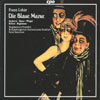Lehár (Die) Blaue Mazur, 'The Blue Mazurka'
Maybe not a masterpiece – but well worth acquiring by Lehár lovers
View record and artist detailsRecord and Artist Details
Composer or Director: Franz Lehár
Genre:
Opera
Label: CPO
Magazine Review Date: 0/0
Media Format: CD or Download
Media Runtime: 0
Mastering:
Stereo
DDD
Catalogue Number: CPO777 331-2

Tracks:
| Composition | Artist Credit |
|---|---|
| (Die) Blaue Mazur, '(The) Blue Mazurka' |
Franz Lehár, Composer
Frank Beermann, Conductor Frankfurt Chamber Choir Frankfurt State Orchestra (Brandenburg) Franz Lehár, Composer |
Author: kYlzrO1BaC7A
The work was a hit in Vienna in 1920 and was produced in all the major operetta centres, including London. However, it soon disappeared from view – except in Italy, from where the most extensive previous recording appeared during the LP era. Now, thanks to Lehár’s publisher’s quest to get as much as possible of his music heard, we have this first complete recording. Most rewarding it is too. Act 2 especially has some gorgeous music in Lehár’s most erotic style (with solo violin and celesta), and there are typically sumptuous waltzes and a rousing march, as well as an opening polonaise, a gavotte and the title mazurka. The performance is extremely well done, with ringing soprano and tenor contributions from Johan Weigel and Johanna Stojkovich, and full-bodied orchestral and choral contributions under Frank Boermann. What is perhaps most lacking – for better or worse – is really contrasted delineation of the comedy pair (Gretl and Adolar), which would certainly have been a feature of the original production.
The distributors claim the work as “musically…one of [Lehár’s] greatest masterpieces”. I’m not sure I’d go so far; but it’s certainly very well worth acquiring by anyone who loves Lehár’s music.
Discover the world's largest classical music catalogue with Presto Music.

Gramophone Digital Club
- Digital Edition
- Digital Archive
- Reviews Database
- Full website access
From £8.75 / month
Subscribe
Gramophone Full Club
- Print Edition
- Digital Edition
- Digital Archive
- Reviews Database
- Full website access
From £11.00 / month
Subscribe
If you are a library, university or other organisation that would be interested in an institutional subscription to Gramophone please click here for further information.




